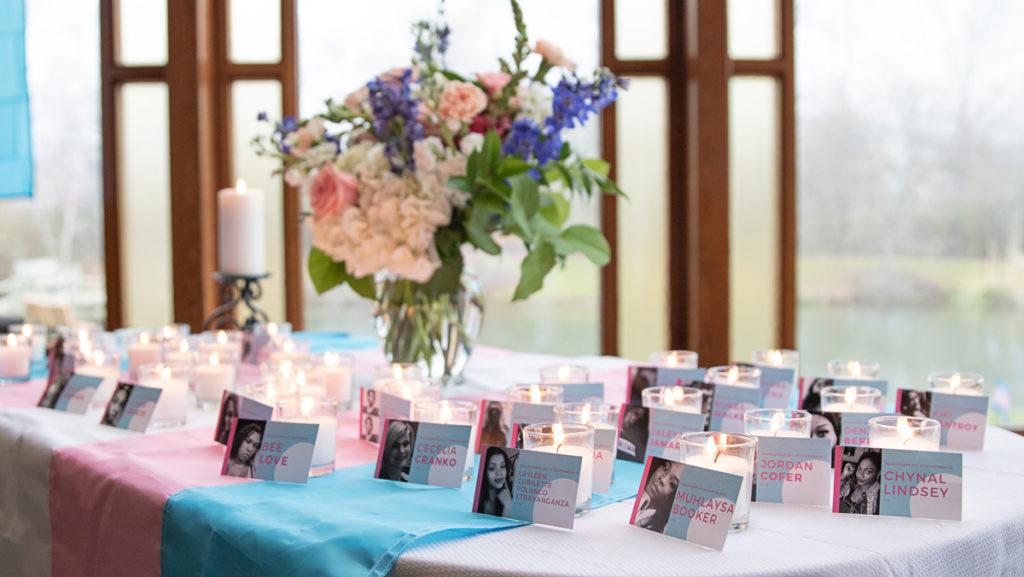The Ithaca College Center for LGBT Education, Outreach, and Services and the Cornell LGBT Resource Center held the annual observance of Transgender Day of Remembrance (TDOR) on Nov. 18, 2021.
The event took place at the First Baptist Church in Ithaca as well as over Zoom. Transgender Day of Remembrance started in 1999 by transgender advocate Gwendolyn Ann Smith as a vigil to honor the memory of Rita Hester, a transgender woman who was killed in 1998. The vigil commemorated all the transgender people lost to violence since Rita Hester’s death, according to GLAAD’s website, a media group that promotes LGBTQ acceptance.
The Human Rights Campaign Foundation (HRC) recorded that 46 transgender and gender non-conforming people were killed in 2021 as of Nov. 17, 2021. The HRC said it has officially recorded more violent deaths of transgender and non-conforming people in 2021 than any year since they have been tracking since 2013, according to its webpage. Forbes released an article that said a total of 375 transgender people were killed globally in 2021 as of Nov. 11.
At the vigil Foula Dimopoulos, an advisor for the Office of Academic Diversity Initiatives at Cornell University, quoted Smith in the beginning remarks.
“Transgender Day of Remembrance seeks to highlight the losses we face due to anti-transgender bigotry and violence,” Smith said. “I am no stranger to the need to fight for our rights, and the right to simply exist is first and foremost. With so many seeking to erase transgender people — sometimes in the most brutal ways possible — it is vitally important that those we lose are remembered, and that we continue to fight for justice.”
Throughout the vigil, names of the dead were read in groups of 100, and for every 20 names, one candle was lit. There was also a final candle that was lit for those who were not named, leaving around 24 candles to be lit.
In between each group of 100 names being read the vigil had readings of poems, performances from AFAB4, an all transgender men quartet, call and response, an interactive prompt and speaker Ryka Aoki.
Crissi Dalfonzo, Cornell University’s interim director for the LGBT Resource Center, introduced AFAB4, an all-transmasculine vocal quartet, which performed “The Village” by Wrabel.
“Wrabel wrote the song in February 2017, just after the Trump administration removed federal protection for trans students in public schools and the music video was released immediately after Trump tweeted about banning transgender individuals from the military,” Dalfonzo said.
Trump announced the ban through a series of tweets in July 2017. In April 2019, a version of Trumps ban went into effect which blocked openly transgender individuals from joining the military and impacted the thousands of transgender members of the military who were currently serving. President Joe Biden reversed the ban Jan. 25, 2021, according to the American Oversight webpage.
Ryka Aoki is a poet, composer, teacher and author. Her work has appeared or been recognized in Vogue, Elle, Publisher’s Weekly, Bustle, Autostraddle, Popsugar, The Daily Dot, The Guardian, Buzzfeed, The San Francisco Bay Times and The Huffington Post. She worked with the American Association of Hiroshima Nagasaki A-Bomb Survivors, where two of her compositions were adopted as the organizations official “songs of peace.”
During her speech Aoki said how she has been attending the TDOR for years.
“I’m so tired of these TDORs never getting any shorter,” Aoki said. “There’s never been a ‘Hey we’re ending early this year!’ or ‘There are no names to read this year, let’s all get cake!’”
Aoki continued to discuss how the TDORs make her feel.
“Theres nothing like that wave of nausea you feel when you open that spreadsheet and you see the names of the trans and gender diverse people who were murdered that year,” Aoki said.
Dimopoulos spoke about the history of TDOR and why it is important.
“We will remember our 460 siblings, most of whom were trans women of color,” Dimopoulos said. “We will remember that our trans siblings have touched the lives of many and, in our remembering, we honor them. We will remember that 20 years later over 4,000 lives have been stolen.”
The vigil discussed the fact that trans women of color face the most violence due to the intersectionality of racism, transphobia, sexism, biphobia and homophobia.
Black trans women also face other inequalities besides violence according to the Harvard Civil Rights – Civil Liberty Law Review. Black trans people have a 26% unemployment rate, 41% of black trans people have been homeless, 34% of black trans people have household incomes less than 10,000 and around half of the black trans population has attempted suicide.
Aoki also discussed the importance of remembrance.
“If we don’t see ourselves in the names of those we have spoken tonight, really see ourselves in some way sharing this violence this pain, if we don’t do that, then exactly who are we bearing witness to and how will their lives linger in our hearts?” Aoki asked.








